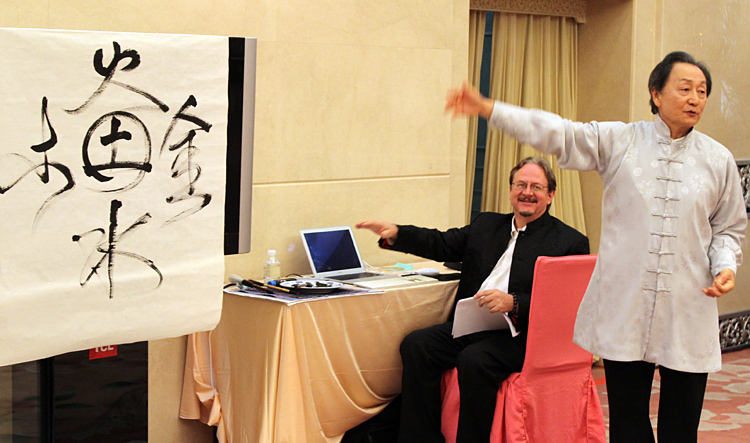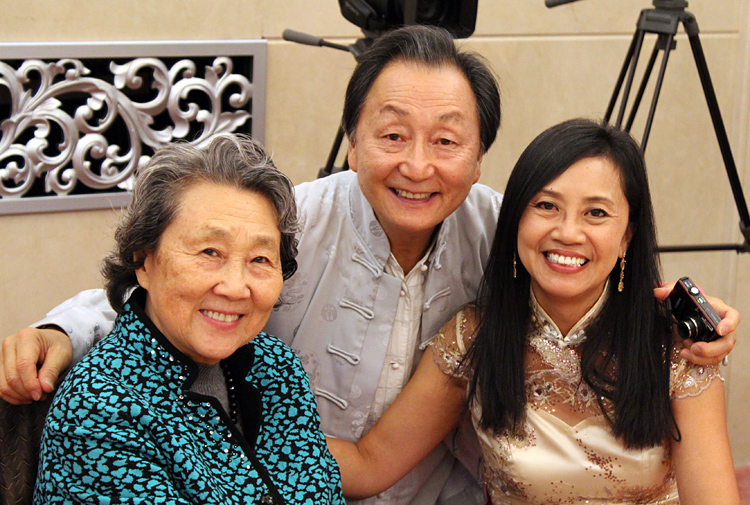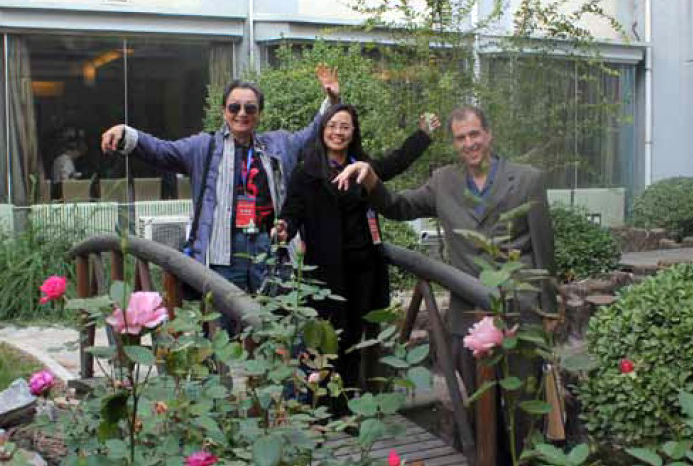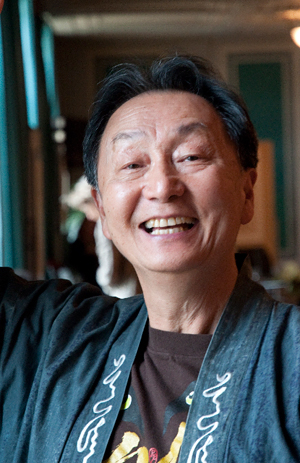In Celebration of Zhou Enlai’s Five Principles of Peace
from The Empty Vessel
Journal of Taoist Philosophy and Practice
Eugene, Oregon, USA
Winter 2014
© copyright 2014, The Abode of the Eternal Dao
website: http://abodetao.com
By Chungliang Al Huang

Chungliang introduced the symbols of the Five Moving Forces of Nature, with co-director of Peace Institute, Michael North
The 60th Anniversary of the Five Principles of Peace, arguably one of the greatest diplomatic achievements of Zhou Enlai, the first Premier of the People’s Republic of China (1949-76) and its Foreign Minister (1949-58), was the occasion of the celebration at the National People’s Congress in Beijing, China on October 20, 2013.
These principles were first written by Premier Zhou Enlai on December 31st, 1953, and have since become an international standard for peaceful relations between all countries, endorsed by the United Nations.
1. Mutual respect for each nation’s territorial integrity and sovereignty;
2. Mutual non-aggression;
3. Mutual non-interference in each other’s internal affairs;
4. Equality and mutual benefit; and
5. Peaceful co-existence.
In Zhou Enlai’s own words, “If these principles were applied not only between various countries but also in international relations generally, they would form a solid foundation for peace and security, and the fears and apprehensions that exist today would give place to a feeling of confidence…”
The recent October gathering in Beijing was also an opportunity to celebrate Zhou Enlai’s 115th birth year at a time when both China and the international community are beginning to acknowledge the importance of Zhou’s legacy to the world.
Many may recall the vivid image when the “Bamboo Curtain” opened to witness Zhou Enlai greeting President Richard Nixon in Beijing on the 21st of February 1972. This historic and dramatic breakthrough was a shining moment for peace in recent World History.
In February of 2013 while lecturing at the Confucius Institute at the University of Hawaii, I encountered the co-directors of the Zhou Enlai Peace Institute (www.zhouenlaipeaceinstitute.org), Michael North and Xiao Fang Zhou, the grand niece Premier Zhou Enlai. This began an exchange, which resulted in an invitation for me to consult, advise, and ultimately participate through a performance at this special gathering of the National People’s Congress in Beijing.

With Zhou Bingde, niece of Zhou Enlai and Angela Wong, a member of Peace Institute advisory board
I have written several stories about Zhou Enlai in my book Quantum Soup. One of which has special significance for me. The fact is he may have been the “matchmaker” for my parents, when they were both young cadets at the renowned Huang-Pu (Whampoa) Military Academy in China, where Zhou was Dean of Political Science.
My father graduated from the first class, and my mother, a dropout from the Jing-ling Women’s College, joined the Northern Expedition to subdue the warlords under Zhou’s directorship. She was subsequently admitted to the Academy, a first for women, and graduated with the select group of women cadets in the sixth class.
During the early years of the Republic of China, both Nationalist and Communist Parties were united to resist and fight the Japanese invasion. The Huang-Pu Military Academy was the gathering place for idealistic patriots of both party members with one heart/one mind. Zhou Enlai was one of their mentors leading the way.
When the Communist People’s Republic of China declared victory to rule China in 1949, our family with my father a high-ranking Nationalist official escaped to Taiwan. I spent my high school years there echoing the call of the Nationalists dream to return to the mainland, while propaganda formed the faces of the enemies: Mao Zedong and Zhu De.
We in the Huang family could not utter a single negative word against Zhou Enlai, because we all realized that without his introduction of my parents, we would not be a family. In addition, for Chinese with an understanding of the preceding events in our recent history, we respected and admired Zhou for being the most savvy and even-handed “Confucianist” go-between of the two feuding parties of Modern China.
He was widely acknowledged on the world stage of the twentieth century as one of the greatest statesmen in modern Chinese history, and revered and beloved by everyone.
The Five Principles of Peace is a diplomatic document, as written by Premier Zhou Enlai, designed to be the basis for productive and peaceful relations among all nations. Because the former Premier was also a student of philosophy, the universal forces present in nature guided his political thinking.
I fully recognize the depth of Zhou Enlai’s insight, and I that the Five Principles of Peace connects to the Five Moving Forces (Wuxing 五行) of change and transformation in nature, according to traditional Chinese philosophy. My meditations brought this synthesis of philosophies to my performance offering:

At the Nankai Univerisity garden with Angela Wong and Roger Epstein, fellow advisors for The Zhou Enlai Peace Institute
First Principle of Peace:
Mutual respect for each nation’s territorial integrity and sovereignty.
Supporting Element:
土
Earth: our root and beginning—the primary element, our birth and source, the land upon which we walk. We respect this land, and the land of all other people. We recognize the right of all to walk upon the land of their origin and seek our destiny there.
Second Principle of Peace:
Mutual non-aggression
Supporting Element:
金
Metal: generated from the earth, it rises in infinite varieties of self-expression. The individual self is creative and powerful when it is balanced with the importance of our larger self—in society, humanity and nature. The power of self should be used to support the prosperity of peace, not to judge, attack or restrict others.
Third Principle of Peace:
Mutual non-interference in each other’s internal affairs.
Supporting Element:
水
Water: generated from metal. Water flows around all obstacles, humbly seeking the lowest position, with great power to form change in the earth. Water combines with the other elements, but does not interfere in their essential nature.
Fourth Principle of Peace:
Equality and mutual benefit
Supporting Element:
木
Wood: generated from water. Wood is used equally by all to create wealth and shelter, for education and the preservation of tradition. Understanding this element helps all to find equality of opportunity, to extend generosity to all, regardless of whether they appear great or small.
Fifth Principle of Peace:
Peaceful co-existence
Supporting Element:
火
Fire: the element that springs from wood, and combines with all the other elements. Fire provides heat for the home, security for the family, light for the spread of knowledge, and inspiration for the soul.
My solo performance at the National People’s Congress combined the ancient art of meditative movement and stillness through Tai Ji, one of China’s great cultural gifts to the world. I wished to show my high respect for Premier Zhou Enlai, and his commitment to lasting peace between the people of China and the people of the world.
I was honored to be introduced to the Congress by Michael North, the co-director of the Zhou Enlai Peace who said, in part: “Our next special guest tonight is Huang Chungliang… another Chinese son of Zhou Enlai, who humbly offers an original dance composition that connects the philosophy of the Five Principles of Peace by Zhou Enlai with the traditional Five Elements of the highest Chinese thought.”
 Ed Note:
Ed Note:
Chungliang Al Huang, philosopher-scholar, brush calligrapher, performing artist, and internationally acclaimed Tao master. Huang is the founder-president of the Living Tao Foundation and the international Lan Ting Institute in the sacred moun-tains in China, and on the Oregon Coast, USA. Dedicated in building bridges for deeper understanding between China and the West, he is one of the most sought after speakers in the fieldof human potentiality, on cultural diversity and creative dynamism in global business, education and all arenas of life. He is a research scholar of the Academia Sinica, a fellow of the World Academy of Art and Science, an assembly member for the Council for A Parliament of the World Religions, and adjunct resident scholar at the Wu Yi Cultural Research Center in China.
He received the highest rated Speaker’s Award from Young Presidents’ Organization, the New Dimensions Broadcaster Award, and the prestigious Gold Medal from the Ministry of Education of the Republic of China. A close colleague and collaborator with the late scholar Alan Watts and mythologist Joseph Campbell, Huang was featured in the inaugural seg-ment of Bill Moyers’ renowned PBS “A World of Ideas” series. He is the author of numerous best-selling books, including the classic, Embrace Tiger, Return To Mountain; Essential Tai Ji; Quantum Soup and The Chinese Book of Animal Powers. And, co- author with Alan Watts of, Tao: The Watercourse Way, and with Dr. Jerry Lynch, of Thinking Body, Dancing Mind; Tao Mentoring; Working Out, Working Within and, The Way of the Champion. www.livingtao.org


